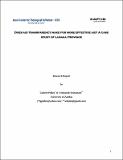Does Aid Transparency Make for More Effective Aid? A Case Study of Lusaka Province
Date
2011Authors
Pollen, Gabriel
Seshamani, Venkatesh
Type
Technical ReportLanguage
enItem Usage Stats
89
views
views
98
downloads
downloads
Abstract
The movement for increasing aid transparency has gained significant momentum in recent years. The purpose of this study is to analyze the link between aid transparency and aid effectiveness. Several studies do not corroborate the hypothesis that aid plays a critical role in fostering economic growth and development in the recipient countries. It has been argued that there are several factors contributing to the ineffectuality of aid in realizing its developmental goals. This study will address the gaps in the transparency evidence base.
The study purposively selected Lusaka Province as a case study and focused on the lower administrative structures for service delivery under two sectors, education and health respectively. It employed a two-tier approach and made use of a standard semi-structured questionnaire in an attempt to decipher the ease of access of information on aid programmes in Zambia. Participants on both tiers comprised of resource persons from the planning units. The analysis based on quantitative scores was supplemented by qualitative assessments.
It was found that the two main funding sources at the central level were the donors and the government and the flow of funds was in a top-down manner. The study found that no significant variability existed in the two sectors studied and data is not readily available due to weak information management systems. It was further found that, the Ministry has put in place a Monitoring and Evaluation (M&E) framework, however, the study recognised that, the stakeholders oftentimes do not know about project/programme intricacies such as actual budget funds, timelines.
The study answers the question regarding the link between aid transparency and aid effectiveness. However, it is important to underscore that while transparency is a key ingredient in making aid more effective, other factors are also important in ensuring that aid funds are more effective. These factors can also contribute to weakening the link between aid and development outcomes. Furthermore, such issues also need to be resolved alongside promotion of transparency.
Description
Is there a link between aid transparency and aid effectiveness? For Zambia, it has been long established that the significant amount of external inflows in the form of aid have not resulted in commensurate development impact. Aid flows on poverty eradication has fallen short of anticipations and debates still continue in terms of ensuring that aid is delivered in a more effective way. This report addresses the gaps in the transparency evidence base. It analyses the link between aid transparency and aid effectiveness.
